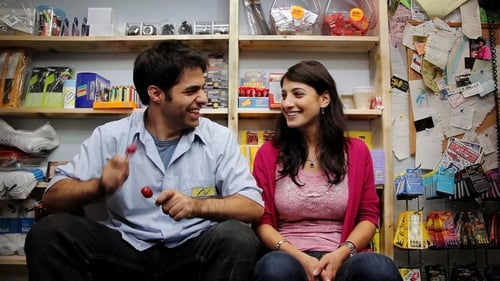
Director
Half Blue is part of the Joe Namy’s long-term poetic exploration on the colors, tones, and language that have emerged around the increasing militarization of police and the greater impact of this aggression, specifically on the artist’s family, friends, and community. The sound piece addresses the many forms of injustice that are symptomatic of aggressive policing, from direct physical violence on communities held suspect, or as systematic violence from a justice system that values certain lives, skin tones, and cultural groups over others.
In Half Blue, Namy offers a space for contemplation, a space to honor those who have fallen victim to this type of injustice, and a space to celebrate strategies for coping and resilience.

Music
Después de un encuentro traumático, un joven egipcio se une al movimiento de los derechos LGBT. Cuando su seguridad está en peligro, debe elegir si permanecer en el país que ama o buscar asilo en otro lugar como refugiado.

Director
This installation is based on two texts that discuss the act of translating war and resilience, the intricacies of the wars in Syria and Iraq, mediated through testimony. The video merely shows a color: purple, projected on a mirrored screen that allows the viewer to see their own reflection, to see themselves within the subtitled text. Lina Mounzer’s essay ‘War in Translation: Giving Voice to the Women of Syria’ weaves the testimonies she is translating with her own personal experience of living through the civil war in Lebanon. Stefan Tarnowski’s essay ‘Subtitling a Film’ describes the intricacies of translating subtitles for the anonymous film collective Abounaddara and the special collaborative process of working for someone he has never met. Tarnowski uses this experience to reflect on the role of the subtitle, the details lost in translation, and what additional elements and contradictions are created by the differences between subtitles and image.

Sound Director
A video that uses the history of a magazine – Cairo’s Al-Hilal ‘50s and ‘60s collection – as the starting point for an inquiry into Jamila Bouhired, the Algerian freedom fighter. An actress designated to play her role is showing the magazine’s covers to the camera. From the different representations of Jamila in cinema to her assimilation and promotion through the magazine, the performance attempts to look at the history of socialist projects in Egypt, anti-colonial wars in Algeria, and the way they have promoted and marginalized feminist projects. The clear gender division used to marginalize women from the public sphere was overcome for a short moment during the Algerian war of independence (Jamila becoming its icon). Different voices and film and print material are used to explore this history. What does it mean to play the role of the freedom fighter? What does it mean to become an icon?

Original Music Composer
An ambitious Lebanese-American youth is forced to take over his family's gas station after his father's death, in this spirited and often hilarious coming-of-age tale from first-time feature director Rola Nashef.



